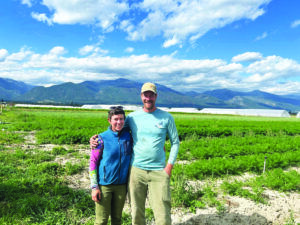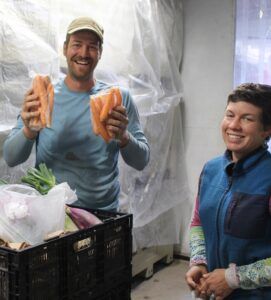
by Michael Howell
Max Smith and Katelyn Madden, owners and operators of Winter Kissed Farms, located south of Stevensville, recently received a USDA grant for $180,000 to expand and enhance their business. Winter Kissed Farm is primarily a vegetable farm but not your ordinary farm. They produce vegetables and greens all year round!
The farm is based on a Community Supported Agriculture (CSA) model in which community members pay up front for a subscription and receive boxes of fresh vegetables, fruits and greens either weekly or bi-weekly throughout the season. The unusual thing about this farm is that it offers both a summer and winter season CSA. The Winter CSA begins in early October and lasts through March.
Madden trained on a farm in upstate New York that specialized in winter growing. When she moved to Montana, she worked at a farm in Arlee called Harlequin Produce whose owners encouraged her to take up an independent project at the tail end of her first year apprenticing. She took up winter growing, trialing different methods and supplies to produce her first December-grown chard, kale, and spinach. When she joined Winter Kissed Farm in 2017, the farm began investing in the greenhouse infrastructure and fabric row cover materials needed to provide winter greens for farmers markets and CSA customers alike.

The farm has been steadily adding tunnel greenhouses annually and currently they cover over an acre of ground. They are passively heated by the sun (not gas heaters) and produce spinach, bok choy, rainbow chard, mustard greens, claytonia (a mild lettuce-type green), and arugula throughout the winter.
The CSAs are delivered to pick-up points in Helena, Kalispel, Missoula, Hamilton and may be picked up at the farm in Stevensville. The deliveries are arranged in a farmer’s market style, allowing some discretion for customers to make some choices.
“Our goal is for shares to consist of approximately half fresh harvested items, like greens, herbs, and specialty vegetables, and half storage crop items, like carrots, squash, and potatoes,” said Smith.
On the farm they have planted pollinator strips for insects and chokecherry trees for birds; they generate solar electricity using 28 photovoltaic panels; they have insulated buildings to r-values beyond what most contractors provide; they don’t use electric or natural gas to heat greenhouses, instead relying on the sunlight to warm the spaces; and they improve the nutrient density of vegetables by conducting soil tests and adding organically-approved nutrients to the soil.
During the pandemic the farm, like many businesses and schools, shifted to an emphasis in on-line operations. Madden designed a website including an on-line store that functions a lot like Amazon. While many of the on-line programs started in the pandemic have since languished, the Winter Kissed Farm on-line store has not and continues to almost double its sales every year.
The recently awarded USDA grant will be used to pay for processing labor and packing labor as well as producing some value-added products such as canned tomatoes and roasted peppers. It will also go toward expanding their subscription base from 350 to 500 by 2027. The farm employs seven to 10 people at about $20 an hour working four days a week or less and never working over eight hours a day.

Grace Nichols, a Program Manager focusing on Specialty Crop Business Development at the Ravalli County Economic Development Authority, helped Madden and Smith apply for the grant.
“This grant is unique in that it is very rare to find grants that pay for labor, most just pay for equipment and supplies,” said Nichols. She also said she believes that Winter Kissed may be the only farm in Montana offering CSAs in the winter.
Nichols said that Smith and Madden worked hard on the grant application and that this particular grant was especially hard to prepare.
“I met with Max and Katey for about an hour each week and they probably put in another five hours a week over the span of two and a half months,” said Nichols. She believes they may have put in over 60 hours total on preparing the application.
Nichols helps small businesses writing business plans as well as in making grant applications. She helps with marketing, distribution and developing business connections with organizations and other business owners engaged in similar production around the state. She currently focuses on specialty crops due to grant restrictions on her work, but will soon be branching out into helping hay, grain and livestock producers as well. She loves to work with start-ups and helps two to three potential producers every month.
“A lot of people have big ideas and good ones,” she said, “and maybe they already have some good production experience but they don’t always know how to take the step by step actions to make their big idea a real business. I can help them with this. I can help them with research and education and help connect them with the organizations and people who can help them out.”
Nichols is currently working with Kendall and Ryan Mouw, the new orchard managers at Swanson’s Mountain View Orchard in Corvallis, for instance, to hold a “Meet and Greet” event on October 10, from 2 to 5 p.m. at the orchard located at 1752 Mountain View Orchard Road near Corvallis.

They are inviting school food service directors and staff, family consumer science teachers, and early childcare education providers to meet Swanson’s new orchard managers and learn about Swanson’s Orchard apple varieties, pricing, and how to order the fruit through Grasmick and the Western Montana Growers Co-Op. In addition, they are collaborating with Jay Stagg from Montana Team Nutrition (based out of MSU), Amber Lyman from OPI, and Molly Kirkham from National Center for Appropriate Technology to teach attendees about incorporating locally grown Montana apples in the Harvest of the Month Program and Montana Crunch Time.
The agenda for the event begins with an orchard and packing facility tour from 2 to 3 p.m., and includes an apple variety taste test, price and procurement discussion with Mouws from 3 to 4 p.m. and from 4 to 5 p.m. a presentation on using Montana apples in Harvest of the Month and Crunch Time activities is planned.
For more information about anything above, contact the Ravalli County Economic Development Authority at (406) 375-9416 and ask for Grace Nichols or email: grace@rceda.org